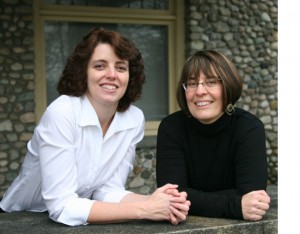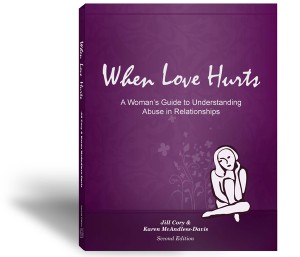When Love Hurts
In honor of Domestic Violence Awareness month in October 2012 ….
It was during a counseling course while getting my Masters degree that I had to choose an issue: I chose “battered women.”
I am not sure what drew me to this topic, but I read every book I could find on it. I gave my presentation and, through that whole process, never identified that I was being abused in my relationship.
The books tended to tell extreme horror stories. It seemed that every book started with a story of woman being murdered by her husband. The so-called “batterers” were monsters that in no way resembled my progressive, socially responsible husband. Only a year and a half into our marriage, I knew that something was very wrong but none of those books helped me to identify that the problem was abuse.
It took another couple of years of suffering before my husband finally got signed up for a counseling group for men who are abusive and I found a support group for women who had experienced abuse.
 We began to learn some incredibly helpful information. We learned that there are many different types of abuse. We learned how all these forms of abuse have a devastating impact on women. And my husband learned that he had a choice; he could change by examining his behaviour and attitudes. He discovered a new way of being in relationship and learned how to be a respectful and truly loving partner. The support and counseling we received was life-changing for both of us.
We began to learn some incredibly helpful information. We learned that there are many different types of abuse. We learned how all these forms of abuse have a devastating impact on women. And my husband learned that he had a choice; he could change by examining his behaviour and attitudes. He discovered a new way of being in relationship and learned how to be a respectful and truly loving partner. The support and counseling we received was life-changing for both of us.
Over time, as I began working as a counselor and wanting to support women who had experienced abuse, I found once again that books in this field were truly lacking. In a particular conversation with a professor I worked with, I stated in despair, “There are just no helpful books on this topic.” She startled me with her response, “Well, then, you should write one.”
I had never imagined for a moment that I would write a book. But I was able to engage the idea gradually by holding it lightly. It was kind of a joke that I told in my own head – “Oh yeah, sure, I’m going to write a book.”
But I saw a need I was passionate about and I imagined filling that need.
When I got started my intention was to work away at it little by little. I worked full-time and had a small child. But then, a few months into it, I had the opportunity to disappear for a few days into a retreat house. Over those few days I wrote the first six chapters of the book. They poured out of me. It was truly an experience of feeling inspired. I was given the words.
I quickly decided to work with a co-author – a colleague and mentor who had many more years of experience in the field. Our process together was dynamic; we brought out the best in each other.
Once we finished a first draft, we faced the painfully slow process of editing. We were new authors and we spent more than a year in editing. That process is something that I appreciate now because the book is so accessible and readable for women. But, at the time, I thought I would never survive the endless rounds of editing. Part way along, we sent an early draft out to various clients for feedback. We were sharing these women’s stories and experiences and their feedback was essential. It particularly shaped our last chapter in the book—a chapter about grieving and rebuilding. Our early readers taught us about that.
I don’t think of myself first and foremost as a writer. What I do is help women to discern the different voices in their life.
Women who are experiencing abuse have many different voices coming at them. They have the voice of their partner – “you’re ugly,” “you’re stupid,” “nobody likes you.” They have the voice of society saying, they’re “attracted to abuse” or they “allow” it somehow. Too often they have professionals, counselors, clergy or others holding them partly or even fully responsible. They have “poor boundaries,” they have “poor communication skills,” or their expectations are “too high” or “too low.”
All these different voices are overwhelming and suffocating. Our book is intended to do what my co-author and I do when we are working one-on-one with women. We want to help women to hear their own voice – that voice that says, “this is not okay” and “I don’t deserve to be treated this way.” That’s what the book does. We tried to write in a style that is similar to how we speak to women – encouraging and affirming, warm and personal.
When Love Hurts begins with a woman wondering if what she is experiencing is abuse. The book walks the reader step-by-step through a dialogue between her experience and information about abusive relationships, allowing her to determine for herself, if, in fact, abuse is what she is experiencing. Women email us often, telling us what a difference our book has made in their life. We are grateful that the book has been very well received.
Although I stumbled into writing, “author” is now one of the descriptors on my business card. I have discovered the power of the written word for reaching women in need and I am thankful.
—
Learn more about Karen McAndless-Davis at her website www.whenlovehurts.ca
Category: US American Women Writers, Women Writing Non-Fiction

























Gill, thanks for your encouraging comments!
Great article. It is so important, as women, that we are allowed to hear our own voice. We all know that abuse like this is not okay and yet are surrounded by people who explain it away. Congratulations on writing the book – the written word is, indeed, powerful. Good luck.